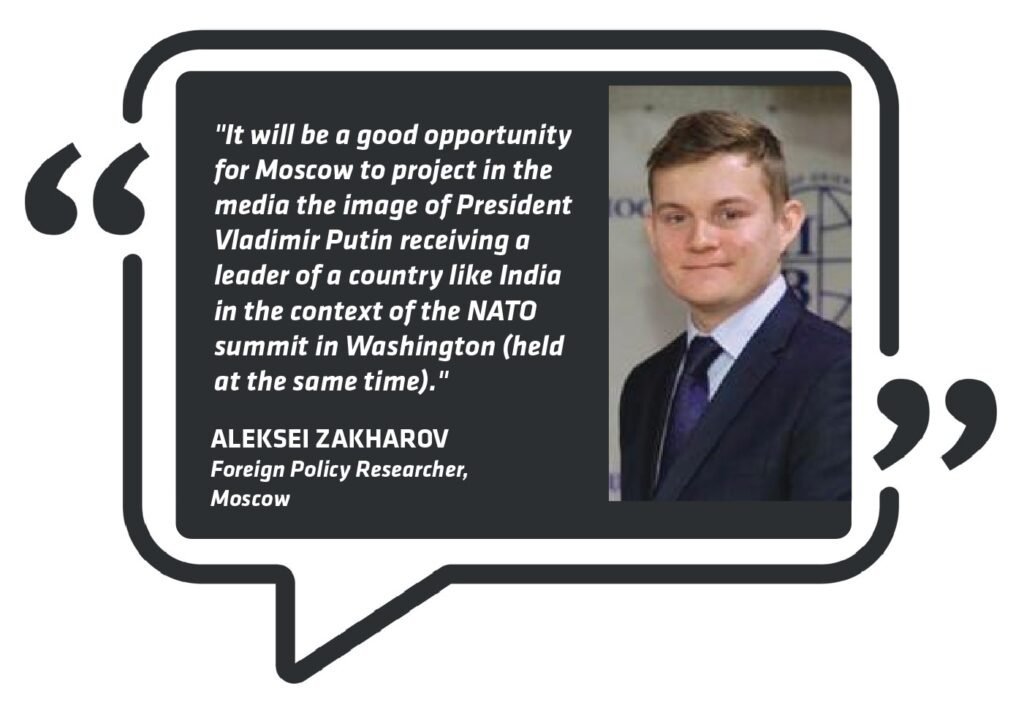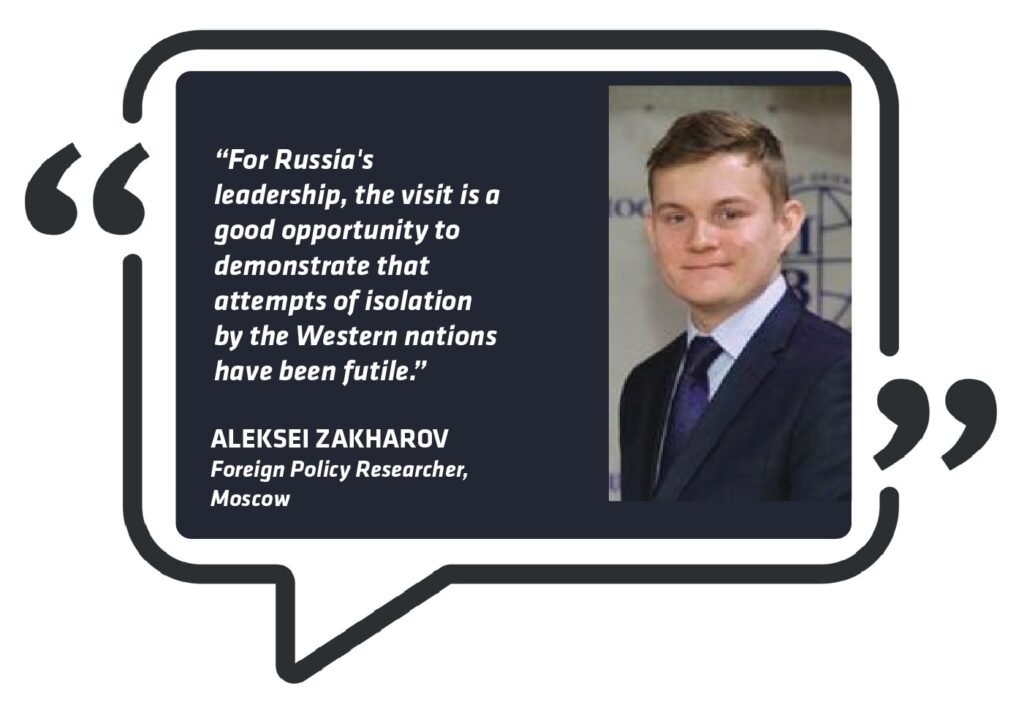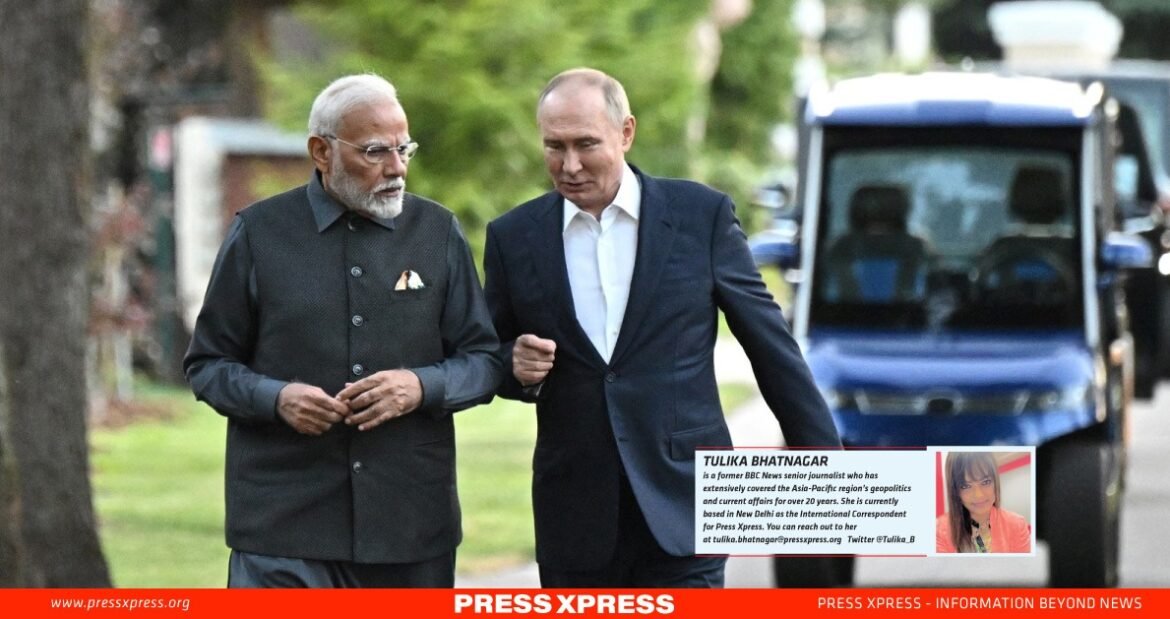Indian Prime Minister Narendra Modi’s formal meeting with Russian President Vladimir Putin in Moscow today is significant on many counts.
To begin with, it is the first bilateral visit by Modi since he began his third term as India’s PM. It also takes place as Putin begins his fifth term.
The two leaders last held bilateral talks in 2021, when Putin visited New Delhi.
According to the Kremlin, Modi’s two-day visit (8-9 July) is “very significant” and will ensure that “no topic will be off limits” for discussion between the two leaders.
You can also read: Bangladesh’s Diplomatic Chessboard: The Significance of Hasina’s Upcoming Visit to China
The Kremlin also released a video of an informal meeting last evening between Putin and Modi at the Novo-Ogaryovo presidential residence near Moscow. The footage shows the two leaders moving around in a small vehicle resembling a golf cart. While strolling through the garden, they engage in active discussions, both one-on-one and with interpreters.
Later, Modi posted ‘thank you’ notes on his X handle in both Russian and English languages, along with pictures of himself and Putin hugging each other.
A ‘jealous’ West?
The United States has expressed concerns over India-Russia relations in context of Modi’s ongoing visit.
“We would urge India, as we do any country engaging with Russia, to make clear that any resolution to the conflict in Ukraine must respect the UN Charter regarding Ukraine’s territorial integrity and sovereignty,” State Department spokesman Matthew Miller told reporters. “India is a strategic partner with whom we engage in full and frank dialogue, including our concerns about its relationship with Russia.”
Quite tellingly, this visit is happening just when the heads of the Western military alliance NATO (North Atlantic Treaty Organisation), will discuss the Russia-Ukraine war in a summit (9-11 July) in Washington. “Allies will agree a financial pledge and more immediate military support for Ukraine. In fact, “Ukraine is moving closer to NATO”, according to NATO Secretary General Jens Stoltenberg.
The timing of Modi’s visit has therefore, raised questions about the signal India could be sending.
“They (the West) are jealous,” claimed the Kremlin. “They are watching closely… (it) means they attach great importance (to Modi’s visit). And here, they are not mistaken; there is indeed great significance,”
Peskov said in an interview with Russian media
PressXpress spoke with Moscow-based foreign policy expert Aleksei Zakharov about the significance and timing of the visit in context of the NATO summit.
“I don’t think this visit has anything to do with the NATO summit,” Zakharov said. “But of course it will be a good opportunity for Moscow to project in the media the image of President Putin receiving a leader of a country like India in the context of the Washington summit.”

What’s at stake?
Russia is currently grappling with unprecedented Western sanctions. In fact, it is the most sanctioned country in the world today.
More than 16,000 sanctions are imposed against Russia, aiming to financially cripple the country from funding its war against Ukraine.
So, the Ukraine war and the Western sanctions will play out heavily in every aspect of the discussion between Modi and Putin.

“For Russia’s leadership, the visit is a good opportunity to demonstrate that attempts of isolation (by the Western nations) were futile,” Zakharov told this reporter from PressXpress.
“For Russian businesses, the meeting sends a signal that the two states are willing to address the existing hurdles, particularly payment issues, and it is worthwhile to discover and invest in the Indian market from a long-term perspective,” he added.
For India too, there are several bilateral issues arising from the Russia-Ukraine war, such as challenges in food and fertilizer supplies as well as dealing with the Western sanctions.
Complications are also in the offing due to India’s strengthening of relations with the US, while at the same time, Russia bolstering ties with China.
In fact, for New Delhi, “it is necessary to ensure that the relationship with Russia is stable and Moscow is continuously neutral vis-a-vis India-China conflict”, notes Zakharov.
However, political diplomacy aside, New Delhi is also keen to prioritize economic diplomacy in the ongoing visit.

Economic diplomacy: Key sectors, agreements
India and Russia had been struggling for decades to enhance their bilateral trade beyond $10 billion.
But New Delhi’s decision to buy more Russian crude oil took this to an unprecedented $65 billion last year.
However, this led to a massive trade deficit with Indian imports from Russia coming to over $60 billion versus only about $5 billion of exports to Russia in 2023-24.
This issue will figure as a main talking point, in trying to find out ways to tackle this trade imbalance. Another issue that will take priority will be resolving the rupee-rouble payment mechanism in a way that Indian banks do not face any Western sanctions.
Other than trade, energy and defence will be key sectors of discussion.
India’s state-owned and private-sector companies are interested in acquiring stakes in the Russian hydrocarbons sector vacated by Western companies. India is also looking for Russia to modernize the defence equipment it has supplied earlier.
According to Russia state-owned media Russia Today, Moscow supports the “Make in India” initiative, and is hoping to sign deals in the defence, security, space, cyber, and civil nuclear domains.
“It will also invite Indian companies set up manufacturing units for consumer goods and industrial products in new Russian regions, and delve into other areas, such as automobiles and transportation, financial services, and agriculture,” an article published in Russia Today reported.
Connectivity is another area that PM Modi will discuss with President Putin. There is likely to be an announcement in this domain – if India’s concerns over Chinese ports are allayed during the bilateral talks.
In particular, there could be announcements around the revamping of the International North South Transport (INSTC) Corridor as well as the Chennai-Vladivostok corridor in the context of the Arctic.
In addition, India may open new consulates to further enhance its outreach in Russia.
One of the lesser talked about issues is the climate change, which will likely be part of the agenda. According to Dr Lydia Kulik, a Senior Research Fellow at the Institute of Oriental Studies, Russian Academy of Sciences, “sustainable development is likely to feature more prominently on the agenda during the bilateral summit” as “ecology and environment is one of the Russian government’s top priority national programs”.
And “India is among the countries most affected by the negative effects of climate change, with almost 85% of its territory within the zone of certain climate risks,” Dr Kulik commented in an opinion piece for Russia Today.
The upcoming summit between Modi and Putin therefore gains huge significance in how the traditionally friendly nations navigate the tricky world of sanctions and geopolitical rivalry to develop new bonds in the multifaceted Indo-Russian partnership.
One thing is for sure, geopolitical and economic stakeholders on both sides are watching closely, as the upcoming meeting promises to deepen cooperation in areas beyond energy and defence.


